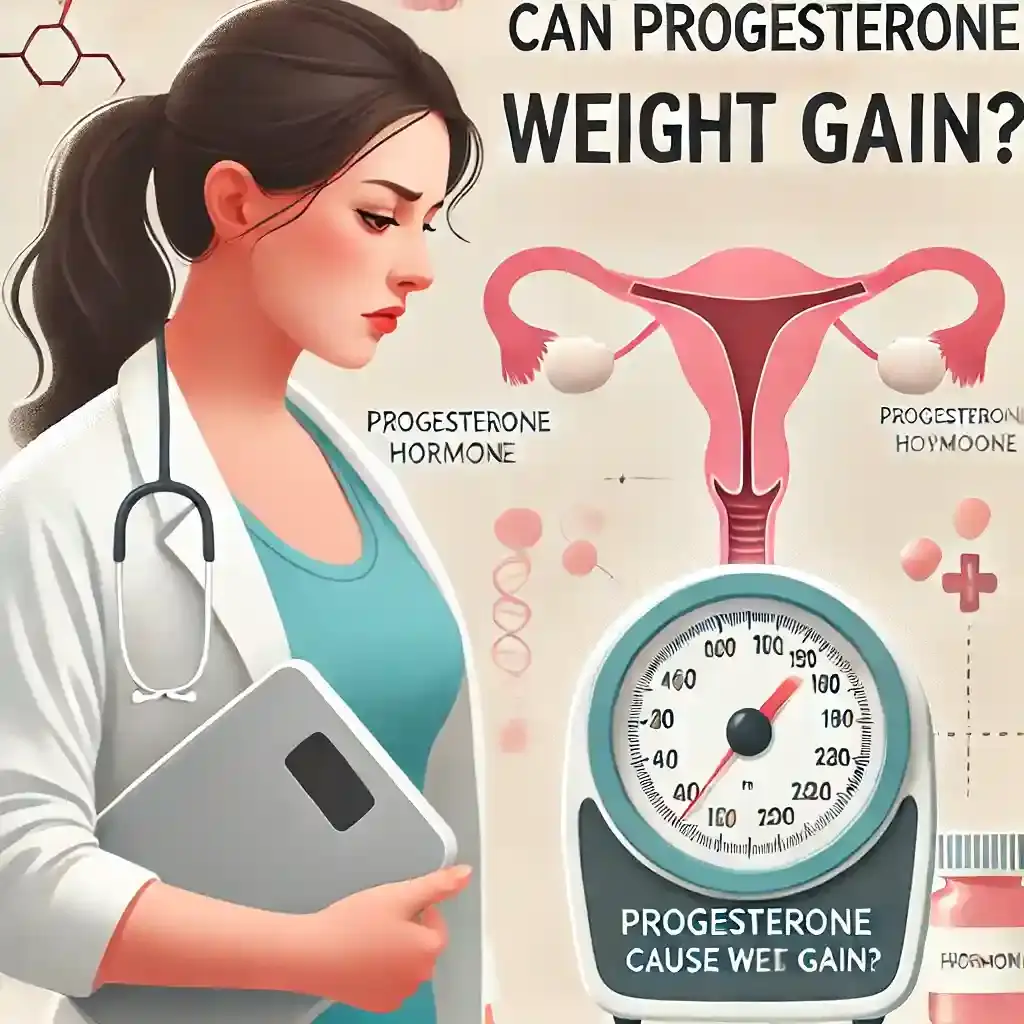Progesterone is a hormone that helps maintain a healthy pregnancy and regulate the menstrual cycle. If you have low progesterone levels and are taking progesterone in the form of birth control or hormone therapy, you might be wondering, “Can Progesterone cause weight gain?” This blog will help you understand the connection between Progesterone and Weight Gain! Additionally, we'll discus the tips to manage body weight during processorone treatment. Read on!
Can Progesterone Cause Weight Gain? Here's the fact
No, Progesterone does not directly lead to weight gainHowever, weight gain during Hormone Therapy Involving Progesterone Can Indirectly Occur Due to Several Changes in Bodily Functions. Theose may include:
Some individuals Taking Progesterone Supplements or Related Treats Can Experience an imbalance in their hormonal levels. This can lead to weight gain. Research Reports that Progesterone Taken as Part of in-Vitro Fertilization Treatment Contributes to Weight Gain.
Progesterone can slow the metabolic rate at which the body cells burn off consumed calories. This Occurs due to the processer's interaction with other hormones When metabolism is slow, fewer calories are burned, leading to weight gain.
Progesterone-Induced Appetite Changes Can Occur Due to the Impact of Progesterone on the Hunger Signals in the Brain, Leading to High-Calorie Intake. Increased Appetite May Contribute to Cravings for Foods High in Fats and Carbs, or Overening Issues which can contribute to weight gain.
Progesterone Treatments Can also Cause Fluid Retention in the Body, Especially by Raising Sodium Retention. This can temporarily contribute to weight gain, particularly when using progesterone-based medicines.
-
Blood Sugar Level Fluctation
Progesterone may affect glucose metabolism and insulin sensitivity. With reduced insulin sensitivity, the body tends to store more fat, especially in the Abdominal Area, Leading to Weight Gain.
Note: Not everyone will gain weight on Progesterone Treatment which may vary depending on metabolism, age, age, and lifestyle factors.
Is Weight Gain from Progesterone Treatment Permanent?
No, Weight Gain is not Permanent With Progesterone Treatment as it is basically due to Hormonal Fluctations and Fluid Retention Retention which which is not permanent. Once the Hormone Levels Get Stabilized after Stopping The Use of Progesterone-Based Medicals, Weight Might Return to Normal.
However, if changes in metabolism and high appetiite remain for a long time, an individual may experience chronic weight gain. In such a case, see a doctor for effective weight management options.
Does Progesterone Lead to Weight Gain during Pregnancy?
Yes, Progesterone Can Cause Weight Gain during pregnancy. It is basically normal to gain weight during pregnancy. It's recommended that gaining 25- 35 pounds is normal during pregnancy. However, Progesterone is not the only contributing factor.
Along with Progesterone Treatment, these facts can also lead to weight gain during pregnancy:
Tips to Manage Weight Gain during Progesterone Treatment
Consider these tips to manage your body weight during progesterone treatment:
-
Focus on your diet: Add nutrient-dense foods such as lean proteins, whole grains, healthy fats, fruits, and vegetables to maintain a healthy weight.
-
Exercise regularly: PRACTICE Strength Training and Cardiovascular exercises to effectively boost metabolism.
-
Manage Fluid Retention: Drink a lot of water and lower Sodium Intake to Reduce Bloating and Fluid Retention.
-
Choose Diuretic Foods: Incorporate Natural Diuretic Foods Such as Cucumbers, Cealyry, and Watermelon into your diet to reduce bloating.
-
Get Enough Sleep: AIM to get adequate sleep of 7-9 hours to support metabolism and hormone balance.
Note: If you are Continuous Gaining Body Weight, Consult a Doctor to Adjust the Progesterone Treatment and Sugged other options.
Can Progesterone Lead to Weight Loss?
Thought Progesterone does not directly contribute to weight loss, it can indirectly lead to weight loss, Lowering Inflammation and Maintening Hormonal Levels. How?
-
Progesterone maintains the effects of a hormone called “Estrogen”, which is responsible for storing fat.
-
High Progesterone Levels Can Aid in Preventing Too Much Accumulation of Fat and also support the effective burning of fat.
-
In addition, Progesterone Can Alleviate Inflammation.
All these facts can contribute to weight management. However, other factors like a balanced diet, regular exercise, and hydration also help manage weight.
Final Thoughts
So, Can Progesterone Cause Weight Gain? As we learn in this article Thought it does directly cause weight gain, Progesterone Can Indirectly Impact Metabolism, Appetite, and Blood Sugar Levels, Which Can ContributE to Swing Gain. This weight gain is temporary, however, Each person's response can vary. So, in case you gain weight, consider consuming a balanced diet, exercising regularly, managing fluid retention, and getting enough sleep. If weight gain becomes an issue, see a doctor to know the best course of action.
Read also: Do you Gain Weight on Your Period?
Frequently Asked Questions
Can Progesterone Cause Belly Fat?
Yes, Along With Progesterone, Imbalances of Hormones Such as Insulin, Estrogen, and Cortisol can contribute to belly fat.
What Haappens when a woman starts taking progressterone?
They can experience effects like mood swings, changes in menstrual bleeding, fatigue, bloating, and breast tendernaness, especially in the initial few weeks of Prosecterone Use.
Can Progesterone Make You Feel Tired?
Yes, as Progesterone Levels Increase and Decrease through Life, it can make you feel tired.
Will you lose body weight after stopping the use of Progesterone?
Yes, you can lose weight after discontinuing the use of progressterone but likely not much.
Can Progesterone Treatment Cause Weight Gain Post-Menopause?
Yes, a decrease in Progesterone Levels after menopause can contribute to decreased muscle mass, leading to weight gain.



